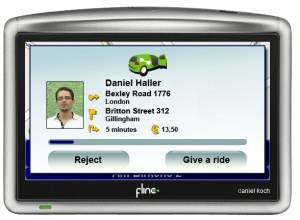It used to be you might need a huge thumb, like Sissy Hankshaw, to be a master of the roadways. Then, along came Craigslist’s rideshare board, making it even easier to get around the world sans car.

Today, Flinc has debuted at the DEMO conference in hopes of forever changing the lives of leather tramps and hitchhikers, or even the car-less simply looking for a lift, worldwide.
Flinc is following in the footsteps of another ride-share app for the iPhone that debuted at DEMO in 2008, Avego. Flinc has one major difference – it will be “the first dynamic ridesharing service that connects Internet-enabled navigation systems with smartphones”, according to a tweet by the company this morning.

Flinc acts as a go-between, matching potential riders with drivers by offering riders with a list of available drivers, including the price and profile for each ride. When a rider picks a driver, the driver can see on the navigation system how far out of their way they would need to go and has the option to refuse or accept the ride request. Any cost for the ride is taken care of by the app.
According to the company, “flinc is a dynamic ridesharing service that can be used on smart phones or online, combining GPS and location based capabilities with social networking to offer a dynamic and automated method of transport.”
The only problem we see, of course, is that a service like this needs to become ubiquitous before it is even slightly useful, so it requires a leap of faith on its users’ ends. Avego, which came out in 2008, says today that it has more than 7,000 “empty seats” worldwide, with 165 in Texas and 75 in Austin. But could we find a ride across town? Not really. Either way, the idea of real-time ride-sharing apps is one we love, both for its greenness and its inherent utility.
What we really love about this is that it doesn’t (from what little we’ve seen on the website) have anything to do with badges or virtual items or “checking in”, like we’ve seen so much with so many location-based services lately. Flinc and Avego both deal with location in its most basic sense: you are in Austin, someone else is in Austin, you both want to go to Arizona, let’s make it happen.

Currently, the project is in initial testing stages and has yet to launch. To this end, it is asking where to go to market first, allowing potential users to suggest its launch location.









